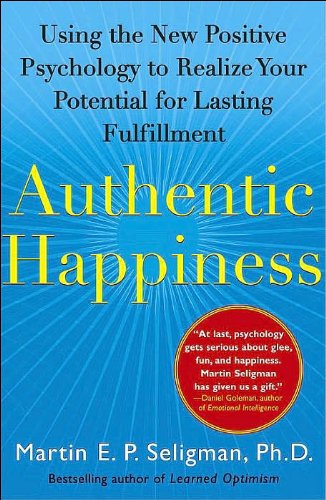A national bestseller, Authentic Happiness launched the revolutionary new science of Positive Psychology—and sparked a coast-to-coast debate on the nature of real happiness.
According to esteemed psychologist and bestselling author Martin Seligman, happiness is not the result of good genes or luck. Real, lasting happiness comes from focusing on one’s personal strengths rather than weaknesses—and working with them to improve all aspects of one’s life. Using practical exercises, brief tests, and a dynamic website program, Seligman shows readers how to identify their highest virtues and use them in ways they haven’t yet considered. Accessible and proven, Authentic Happiness is the most powerful work of popular psychology in years.

The Real McCoy Written by the former president of the American Psychological Association, and author of over a dozen books including the popular , this title is one of the better selling happiness books out there.While this is the kind of book I could write a really long review about, I think I’ll just discuss what I consider to be the best bits for those looking for ways to become happier- which I think is why most people would buy this book. Soooo…..1) the book provides the reader with a “happiness formula”, which is H = S + C + V. This works out to happiness = your genetic Set point + intervening Circumstances + factors under you Voluntary control. So, since your can’t do much about changing your genetics, when it comes to becoming happier, that leaves room for improvement in the areas of circumstances and voluntary activities.2) the book suggests that if you want to lastingly raise your level of happiness by changing the external circumstances of your life, you should: live in a wealthy democracy, get married, avoid negative events and negative emotion, acquire a rich social network, and get religion. Conversely, you needn’t bother to do the following: make more money, stay healthy, get as much education as possible, or try to change your race or move to a sunnier climate. However even if you could alter all of these things, it would not do much for you as this stuff accounts for only a small part of your happiness. On to Voluntary efforts…3) This is where most of the book spends a substantial part of its efforts showing you how to be happier, and there’s a lot of “meat” to sink your teeth into, with sections on how to obtain more satisfaction with your past, what consitutes happiness about the future, and happiness in the present. Also, the book spend much time talking about how happiness can be cultivated by identifying and nurturing our traits, such as humor, optimism, generosity or kindness.Readers who have read other happiness books will already be well familiar with the idea that the best way to increase your happiness is through intentional or voluntary activities. It makes a lot of sense, as you can’t change your genetics, and circumstances are either out of your control, or make very little contributions to your happiness. Like this book, I agree that using intentional activities is the route to go when it comes to raising lasting happiness levels- and this book will help you out with that a lot. Readers might also be interested in .
Extremely valuable book, but needs to be read more than once I quickly read this book a couple of years ago and thought it was very good, but I got little benefit. Then, called to jury duty, I grabbed it going out the door. Sitting a room in LA with 200 people and after reading 4 newspapers, I reread the first 100 pages of this book. But I read it the way I did textbooks, pen in hand, underlining, diagraming, analyzing and synthesizing. I digested the book. I did the forgiveness exercise. I took the surveys and I added up my scores. Then I did the appreciation exercise. I was struck that several of the people I decided I needed to forgive also turned up as people who did things for me that I greatly appreciated. I have moved work and wealth into a lower priority and moved my subjective health, fitness and nutrition into a higher priority. Now, I try to be mindful and savory the experiences of today. I am still struggling with other exercises and methods, but I am grateful to one more person, Dr. Seligman who wrote a great book. My family and coworders enjoy me more. I have ordered the audiobook, too. If you are chronically unhappy, irritable, often angry, this book may be life changing for you. But don’t just breeze throught like I did the first time, read carefully and more than once.
Seligman’s Online Site Beats the Book I heard about this book on NPR a few months ago and checked out the companion website (authentichappiness.org) before buying the book. The site has 17 questionnaires on happiness, optimism, relationships, emotion, and Seligman’s trademark Values in Action Signature Strengths. You can take these tests days or weeks apart and track your progress. It’s an excellent site and does the job of prompting you to buy the book.